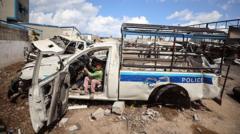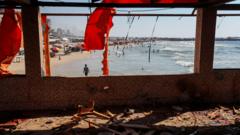President Trump and Israeli Prime Minister Benjamin Netanyahu are set to engage in high-stakes conversations around Gaza and Middle Eastern relations during a private dinner on Monday night in Washington.
Trump and Netanyahu Hold Critical Dinner on Gaza and Regional Stability

Trump and Netanyahu Hold Critical Dinner on Gaza and Regional Stability
Discussions may shape future relations and strategies in the Middle East amid ongoing conflicts.
Following his arrival shortly after 1 a.m., Netanyahu will first consult with key figures, including Steve Witkoff and Marco Rubio, before dining with Trump. This dinner symbolizes Netanyahu's third trip to the White House in 2025, a unique frequency among world leaders, indicating a focused partnership despite personal tensions.
Amid rising tensions, the discussions are expected to center on critical issues: the urgent need for an Israel-Hamas cease-fire, the release of hostages in Gaza, and the consequences of recent U.S. airstrikes targeting Iranian nuclear facilities. Both leaders remain pressured to navigate the complexities of regional stability, balancing their objectives while addressing the dire humanitarian situation in Gaza.
As the talks unfold in the backdrop of these pressing challenges, the relationship between Trump and Netanyahu grows both strategic and complex, driven by necessity in turbulent times. Yet, the question remains—can they forge a viable path toward peace and security in the Middle East?
Amid rising tensions, the discussions are expected to center on critical issues: the urgent need for an Israel-Hamas cease-fire, the release of hostages in Gaza, and the consequences of recent U.S. airstrikes targeting Iranian nuclear facilities. Both leaders remain pressured to navigate the complexities of regional stability, balancing their objectives while addressing the dire humanitarian situation in Gaza.
As the talks unfold in the backdrop of these pressing challenges, the relationship between Trump and Netanyahu grows both strategic and complex, driven by necessity in turbulent times. Yet, the question remains—can they forge a viable path toward peace and security in the Middle East?


















